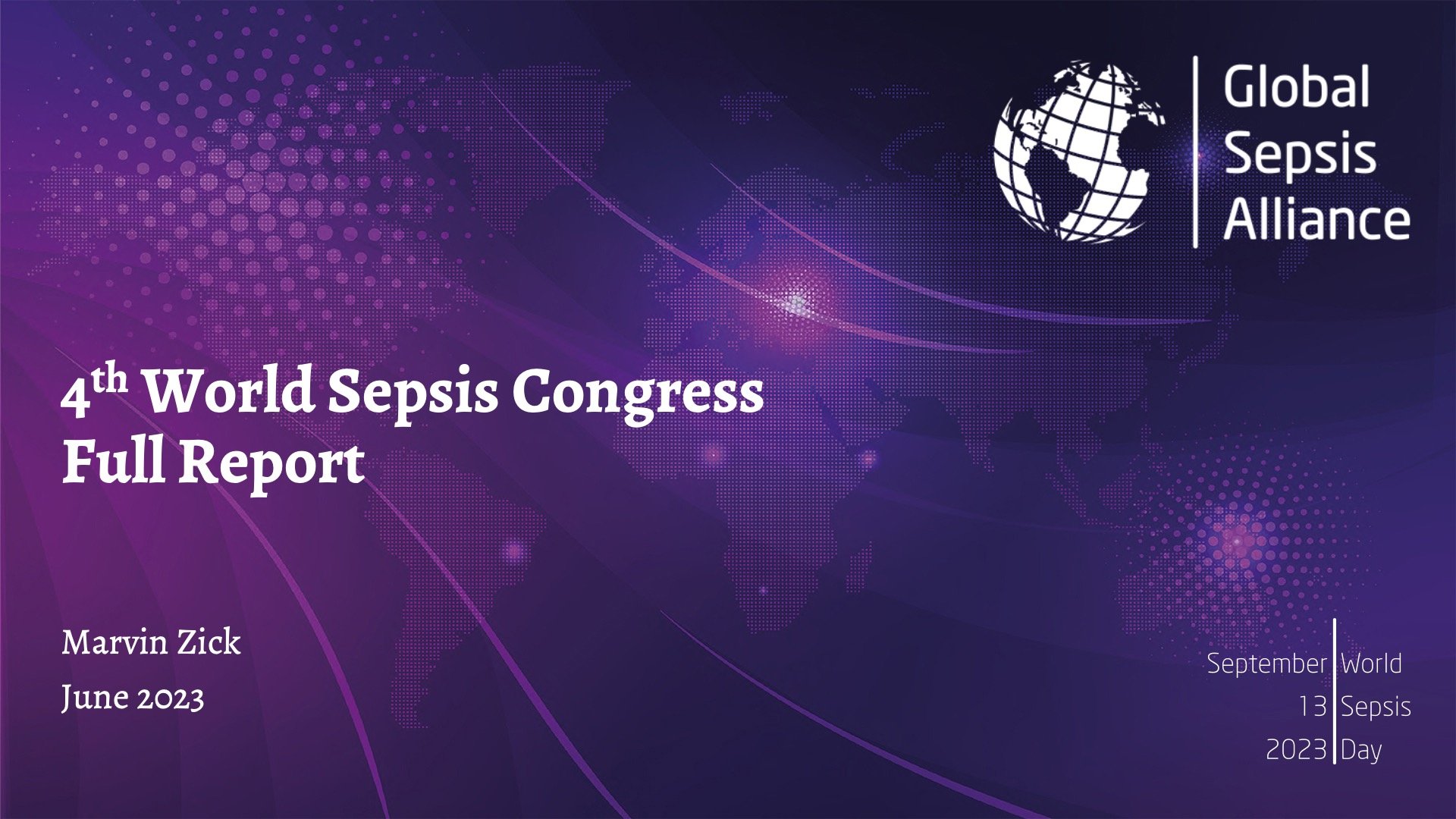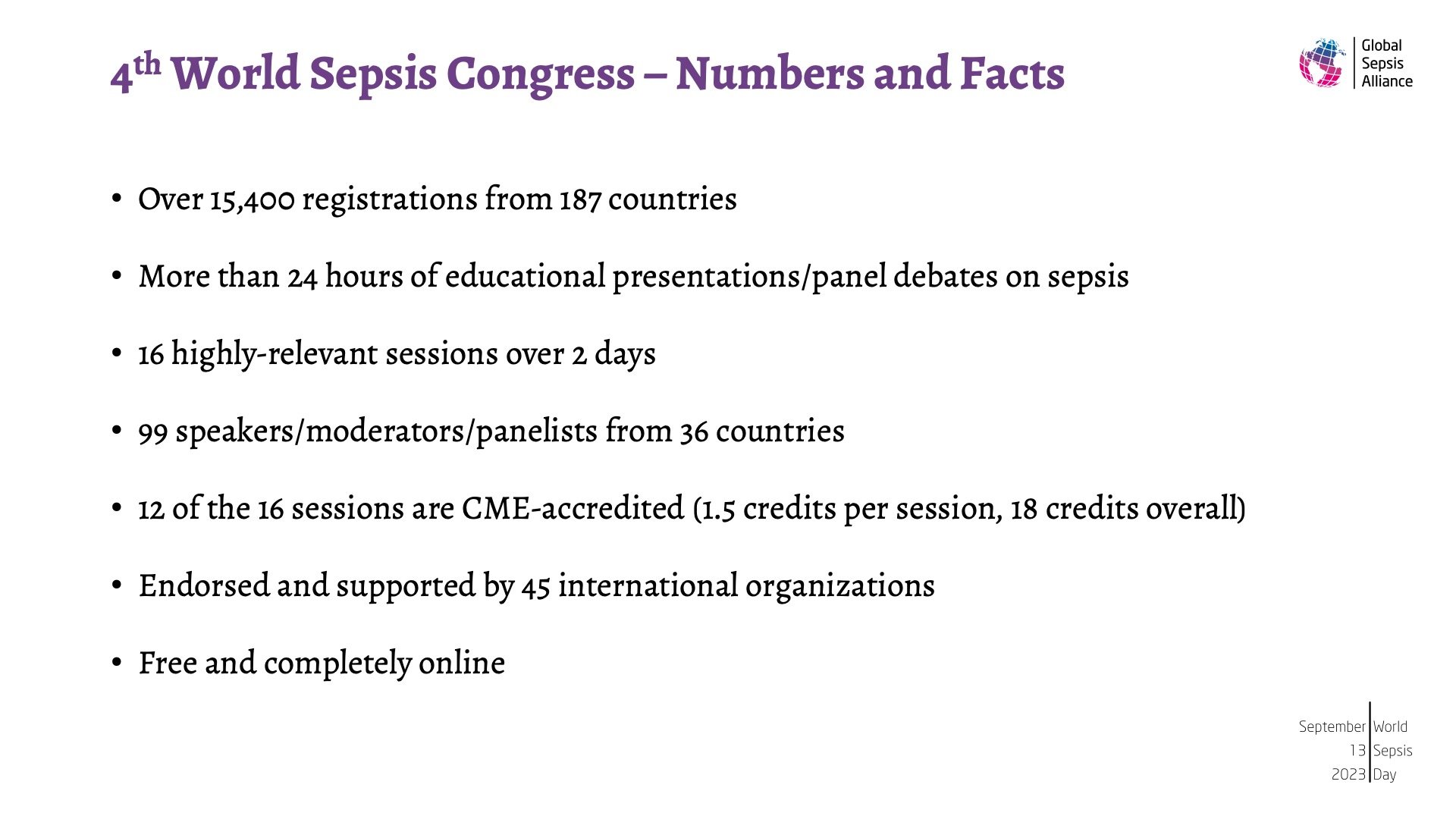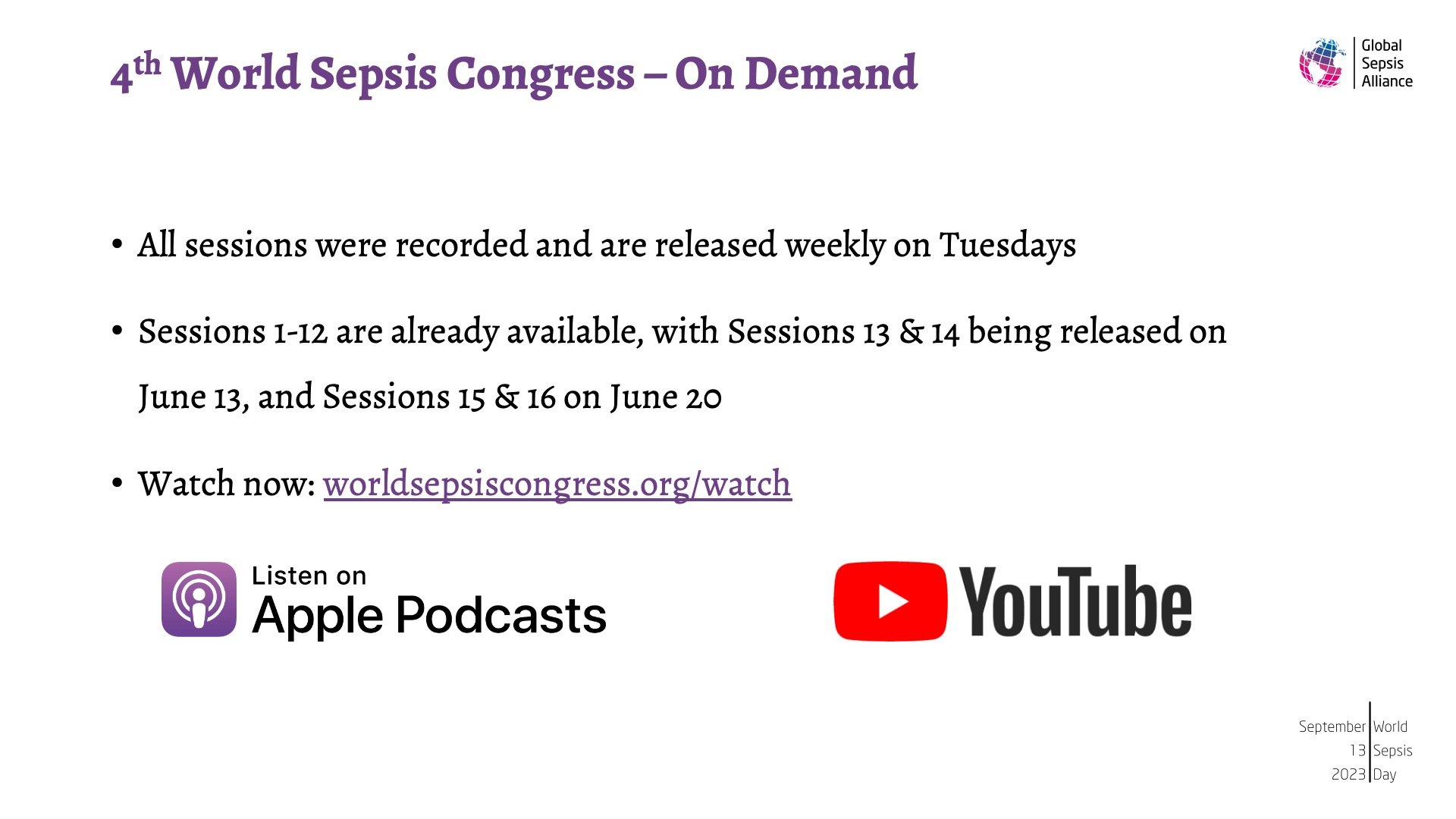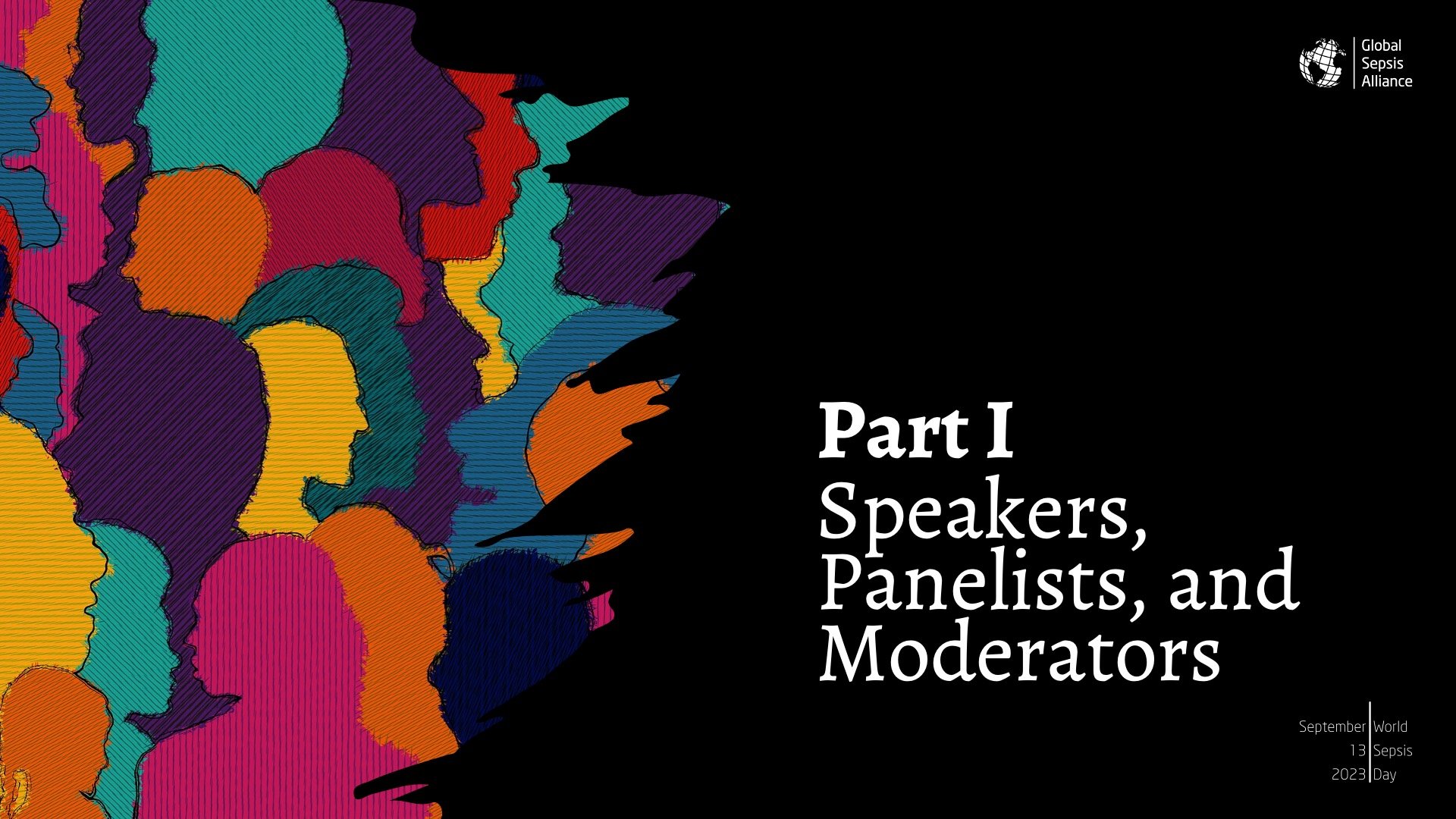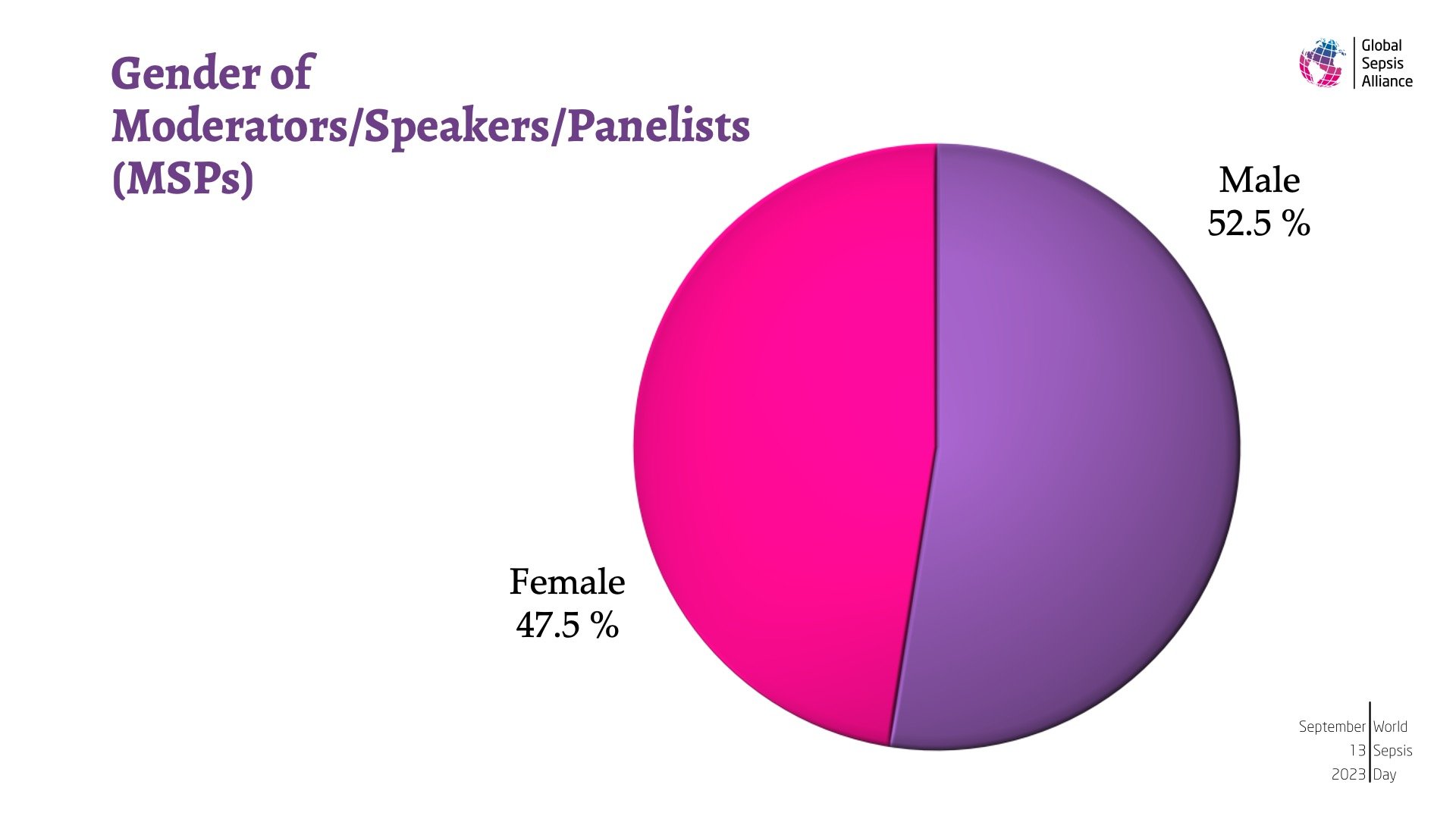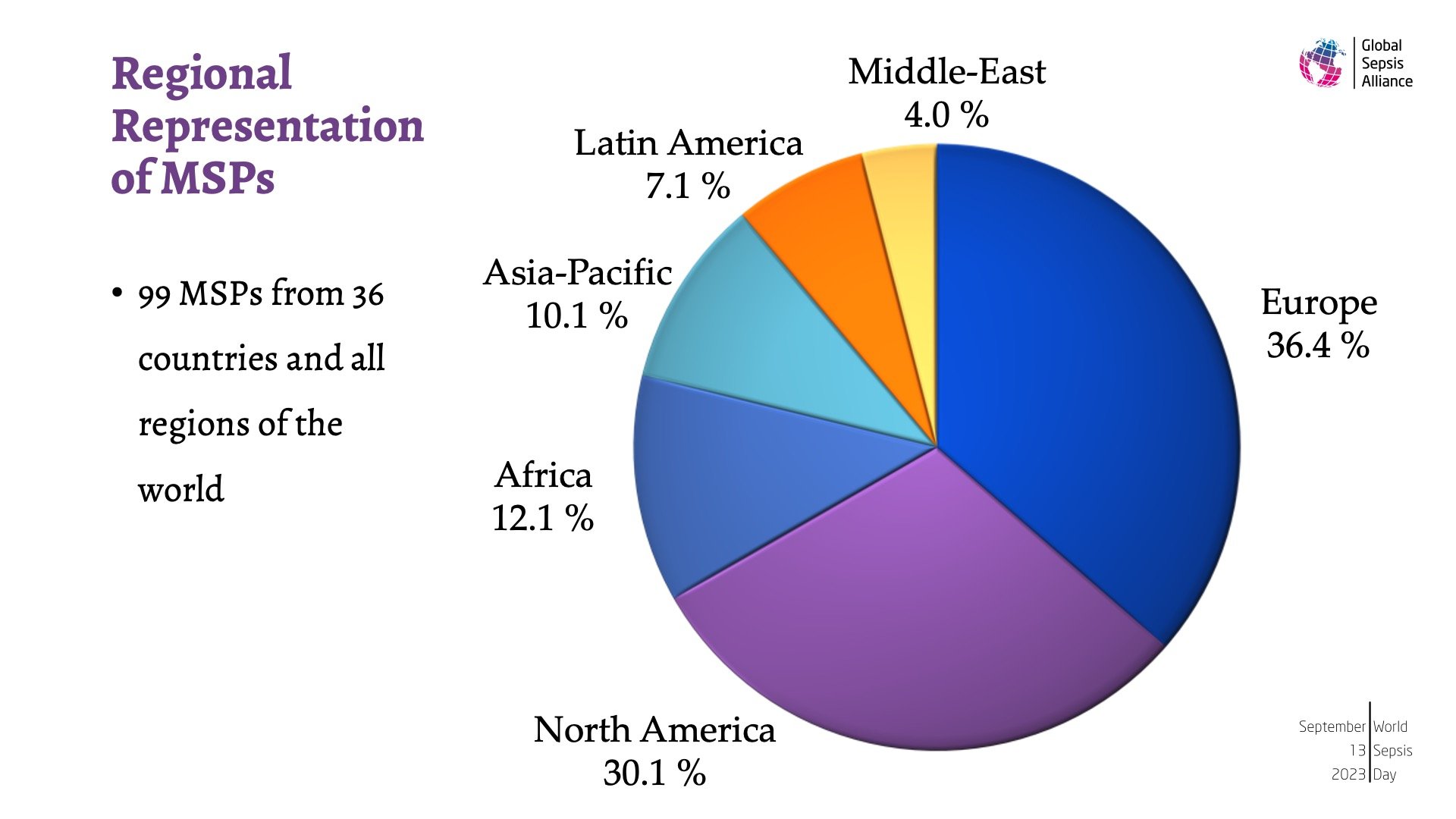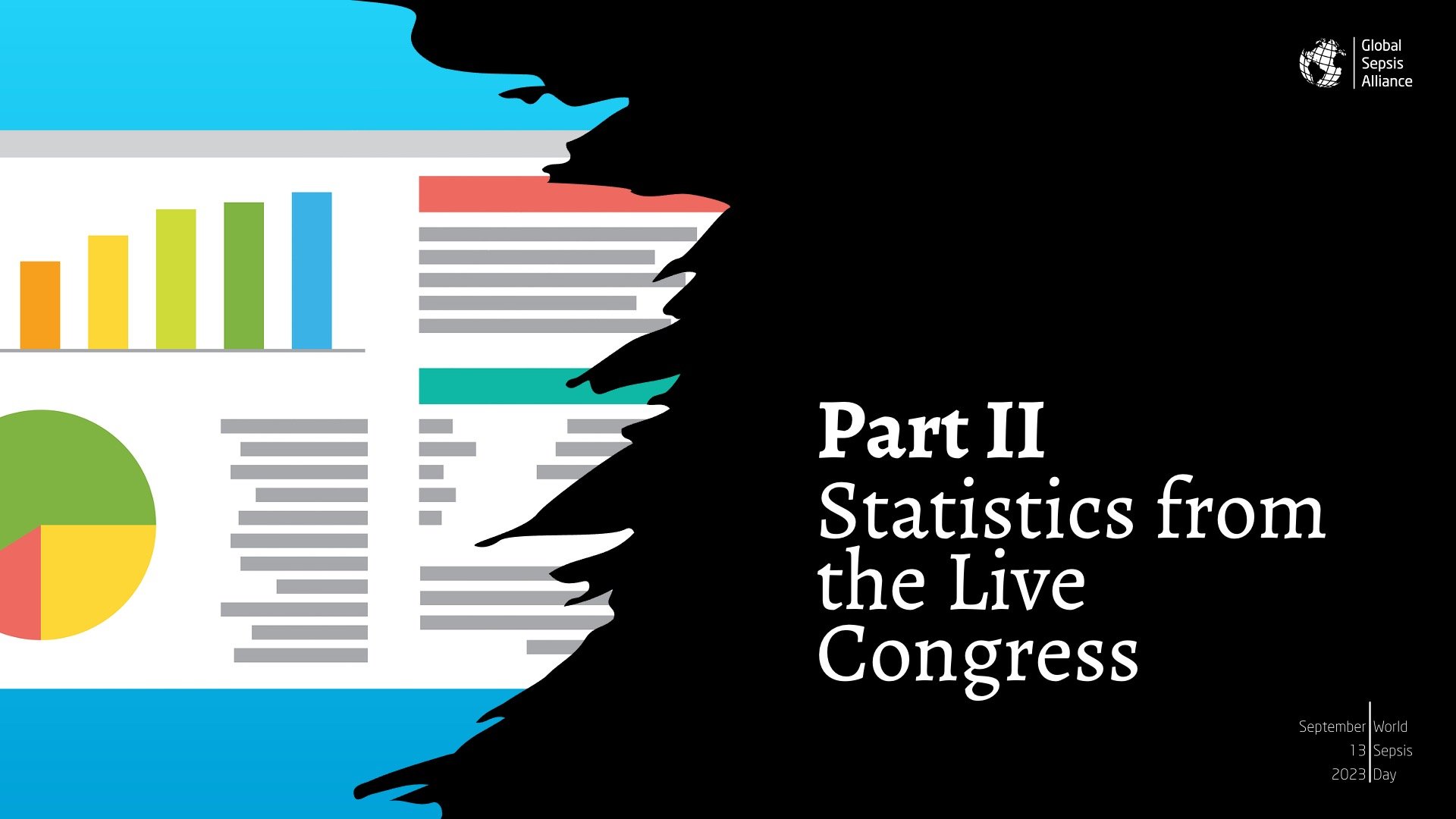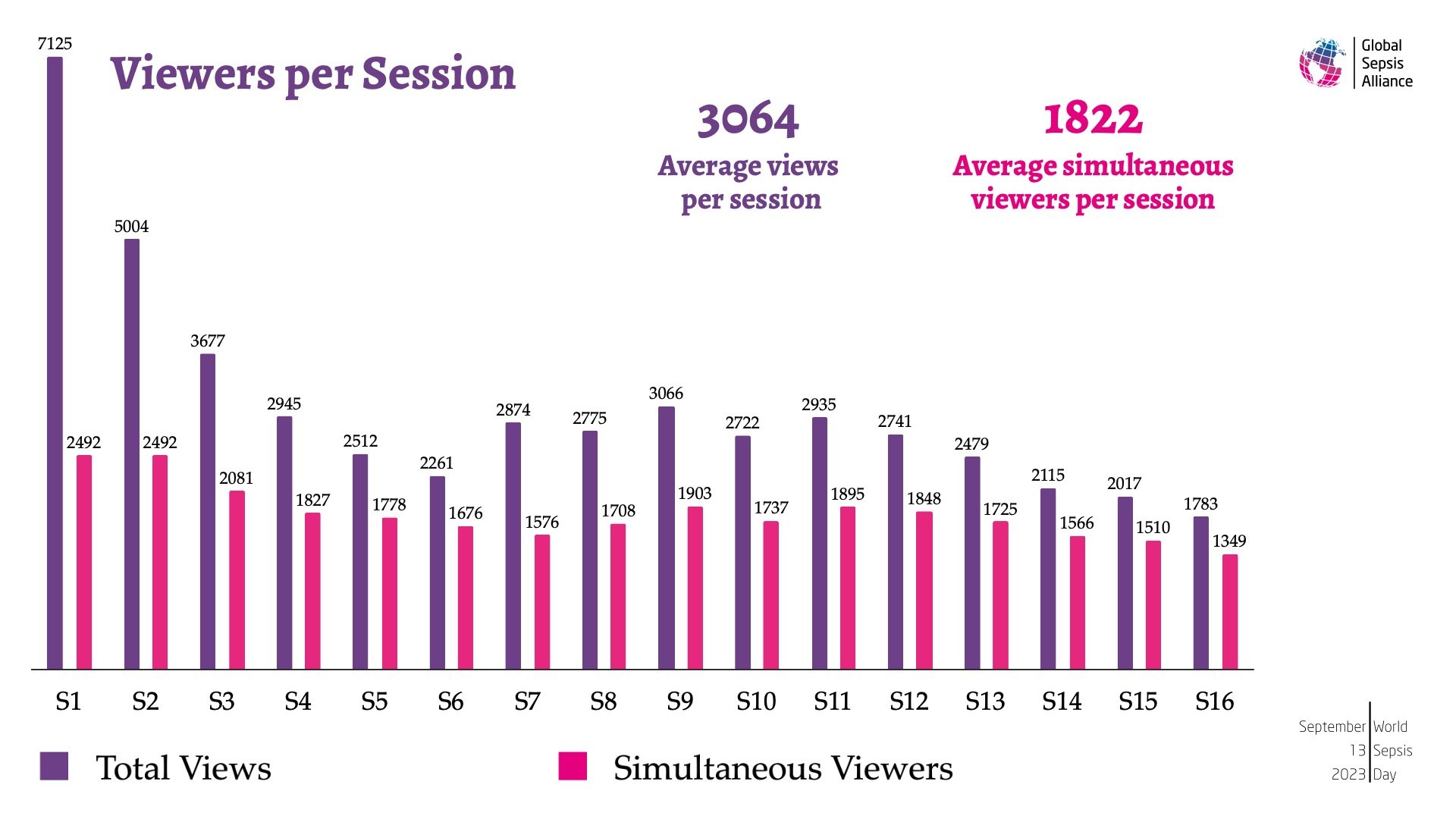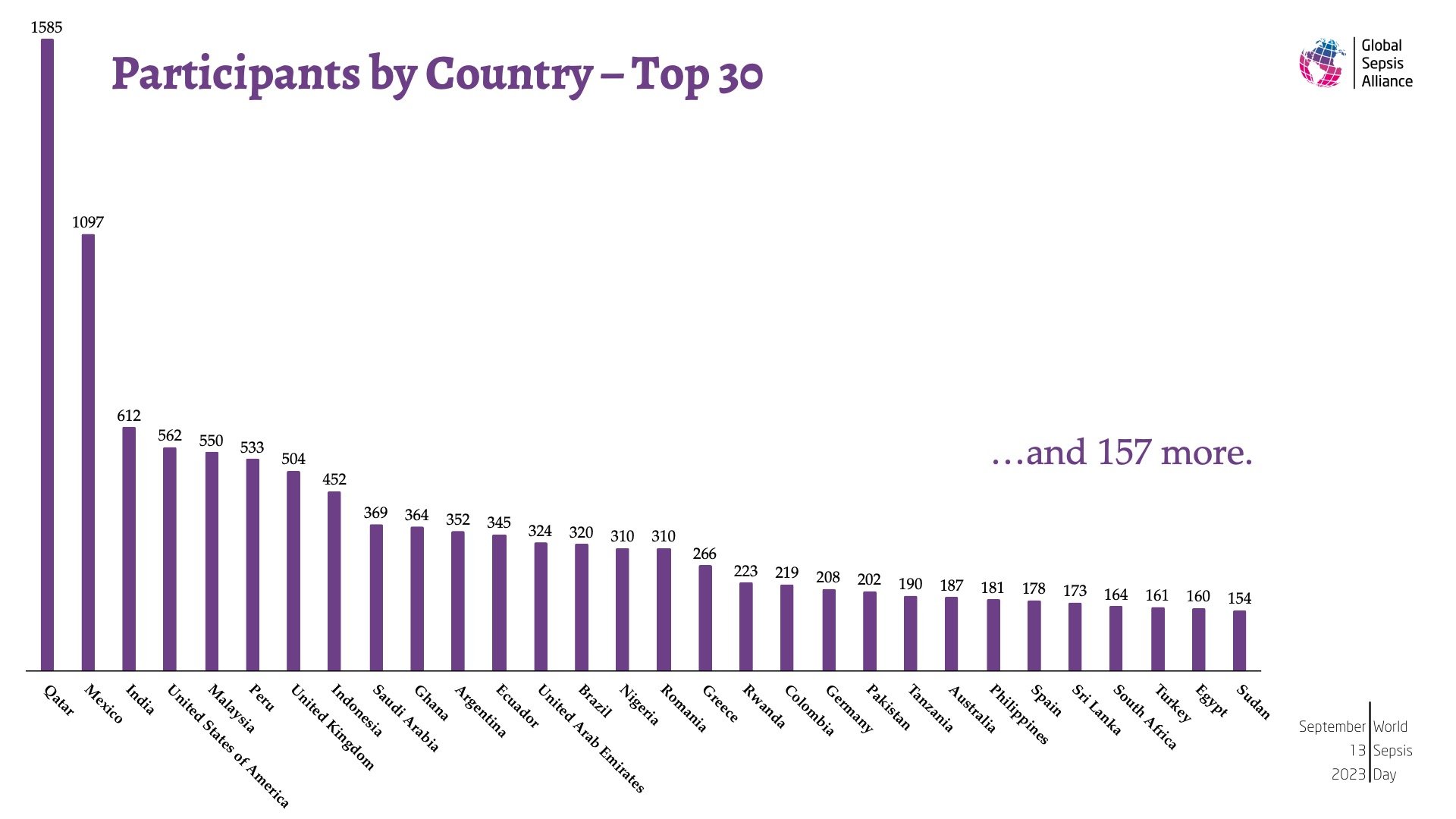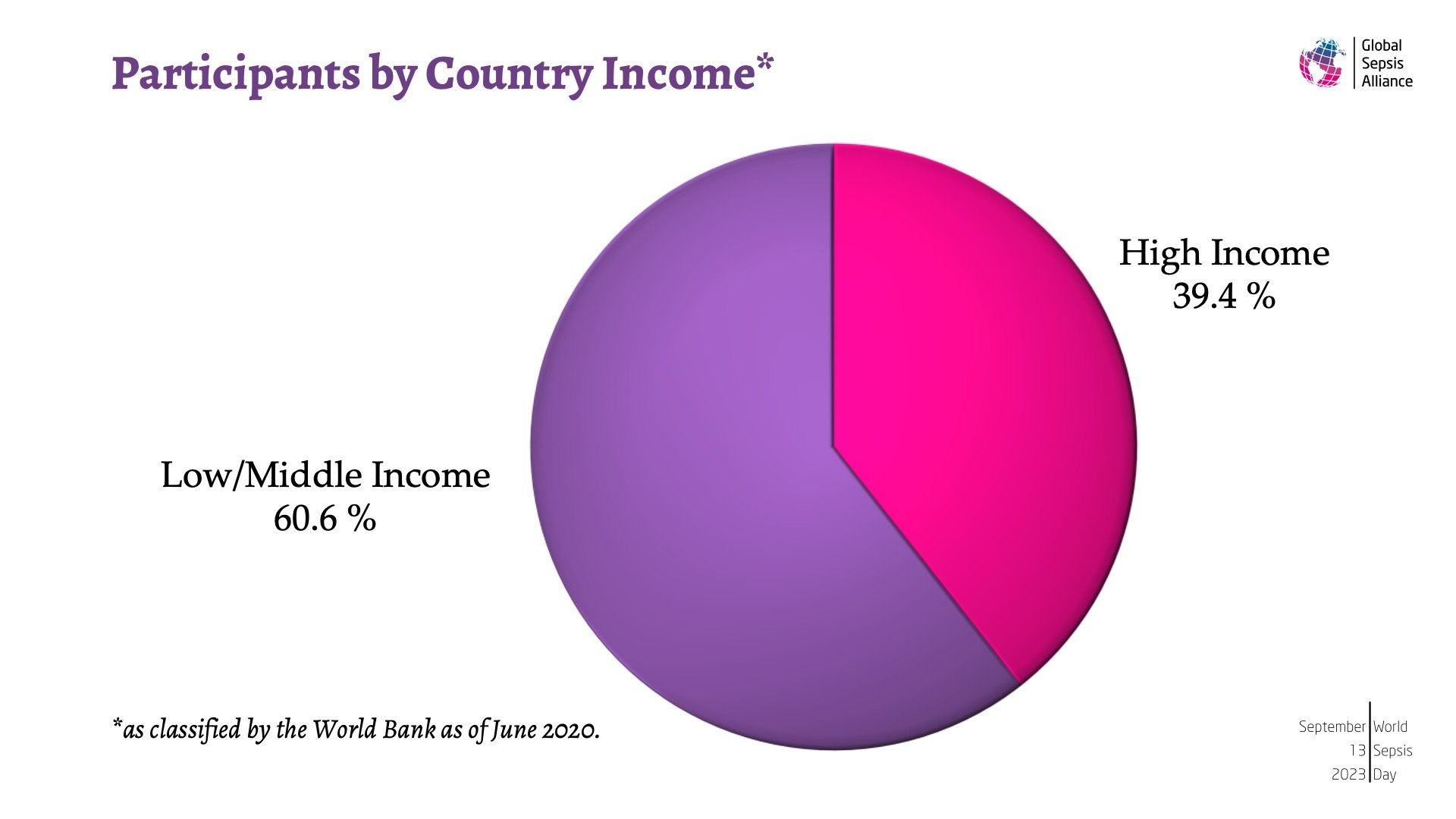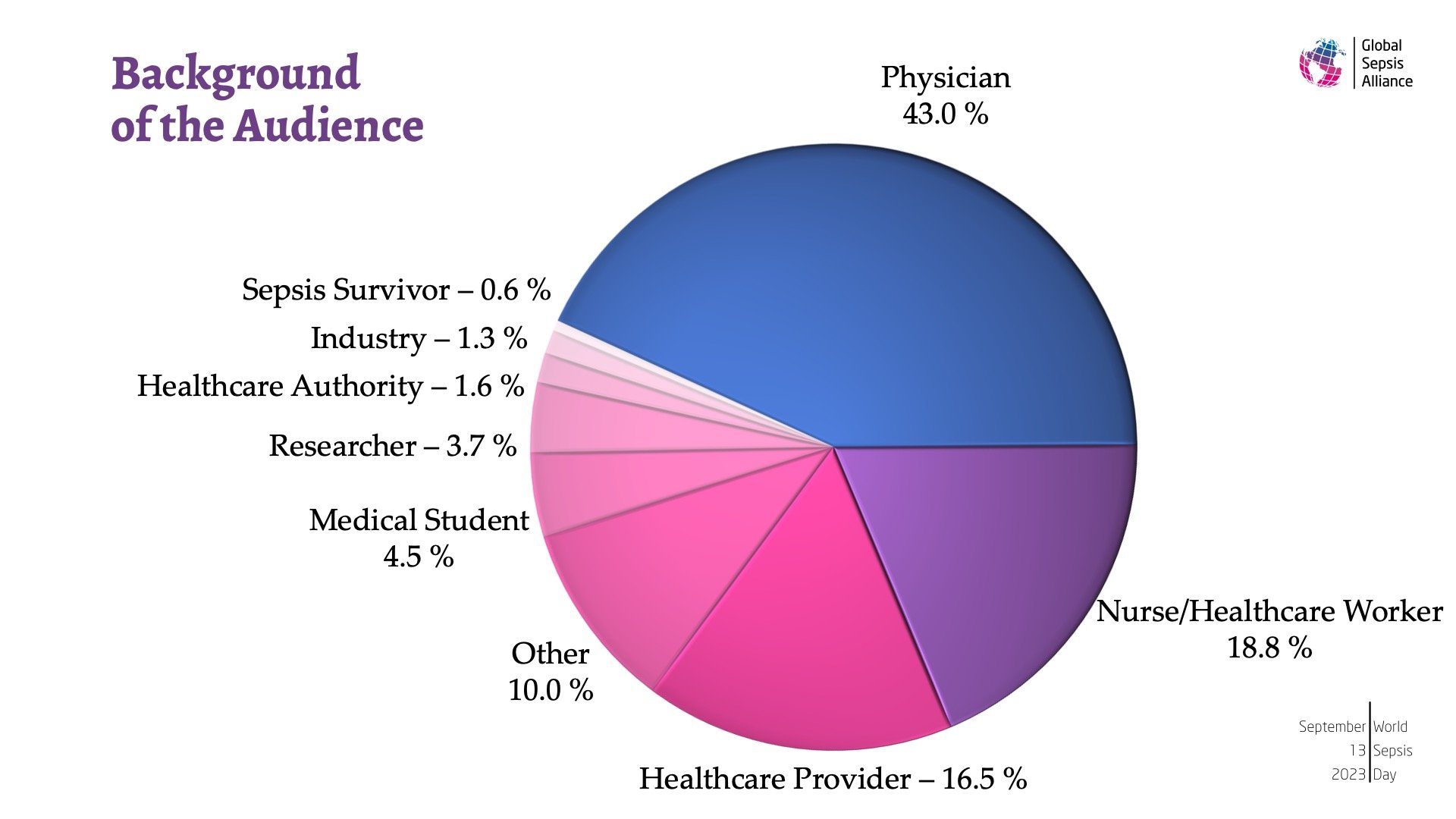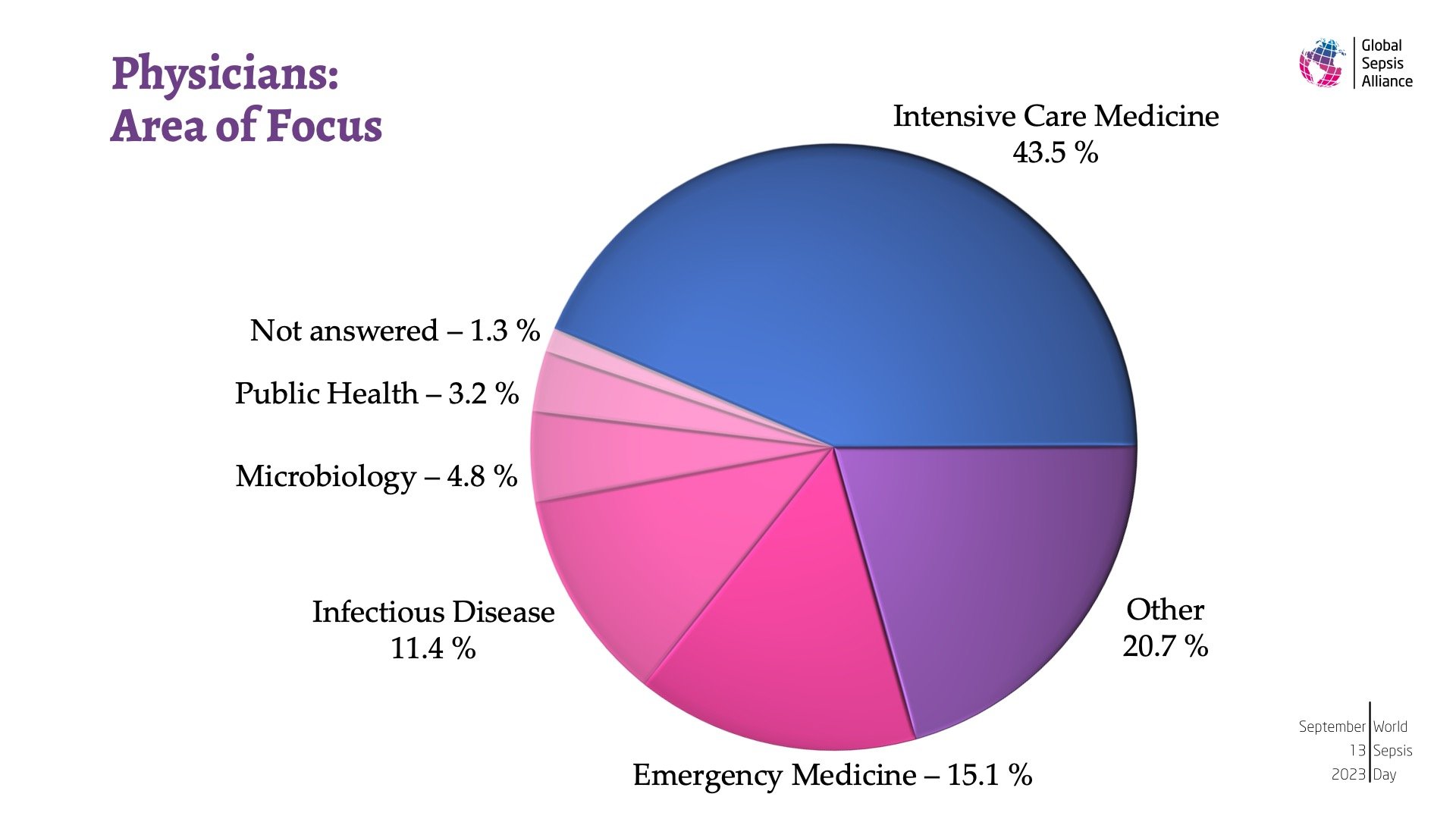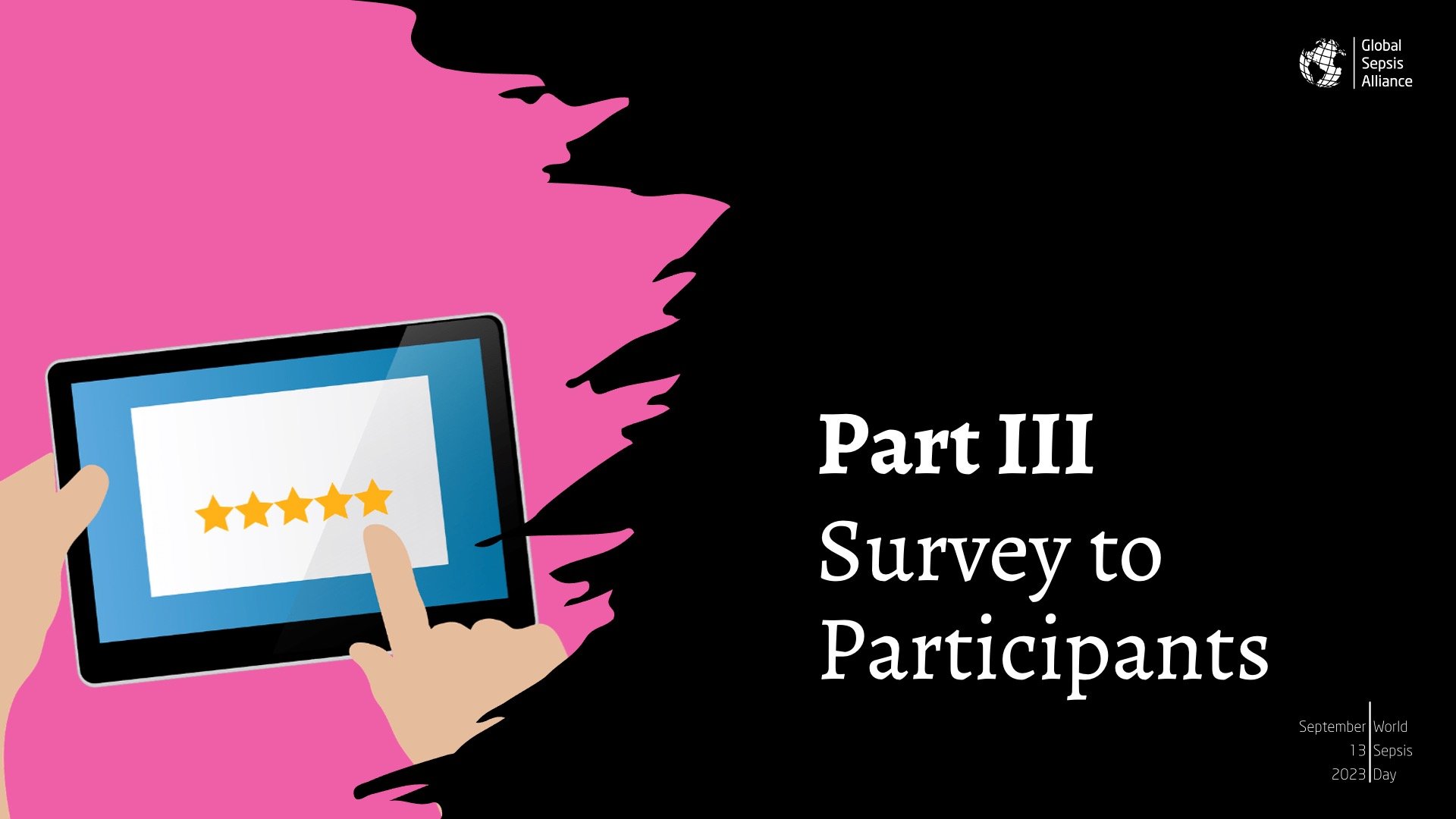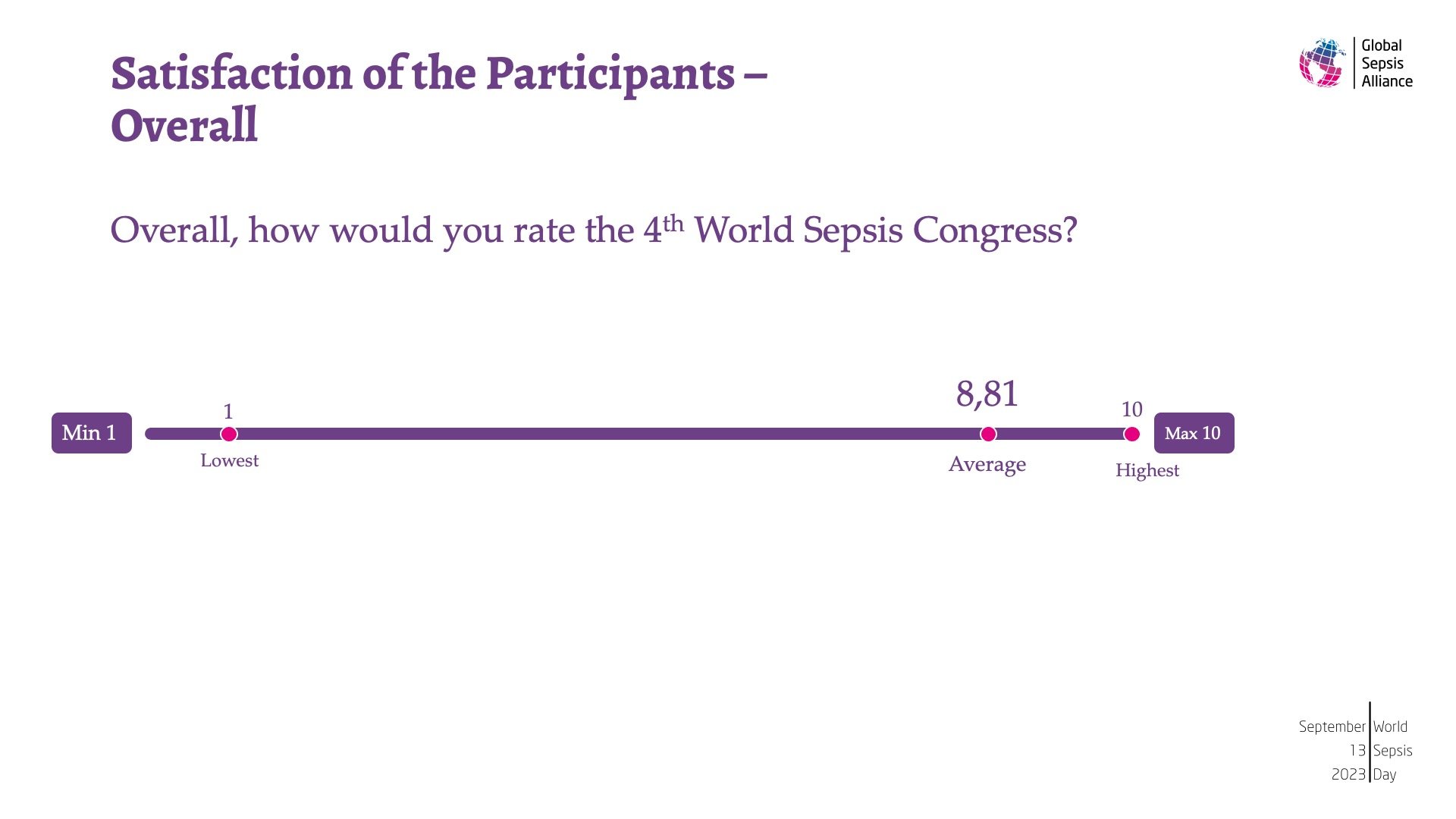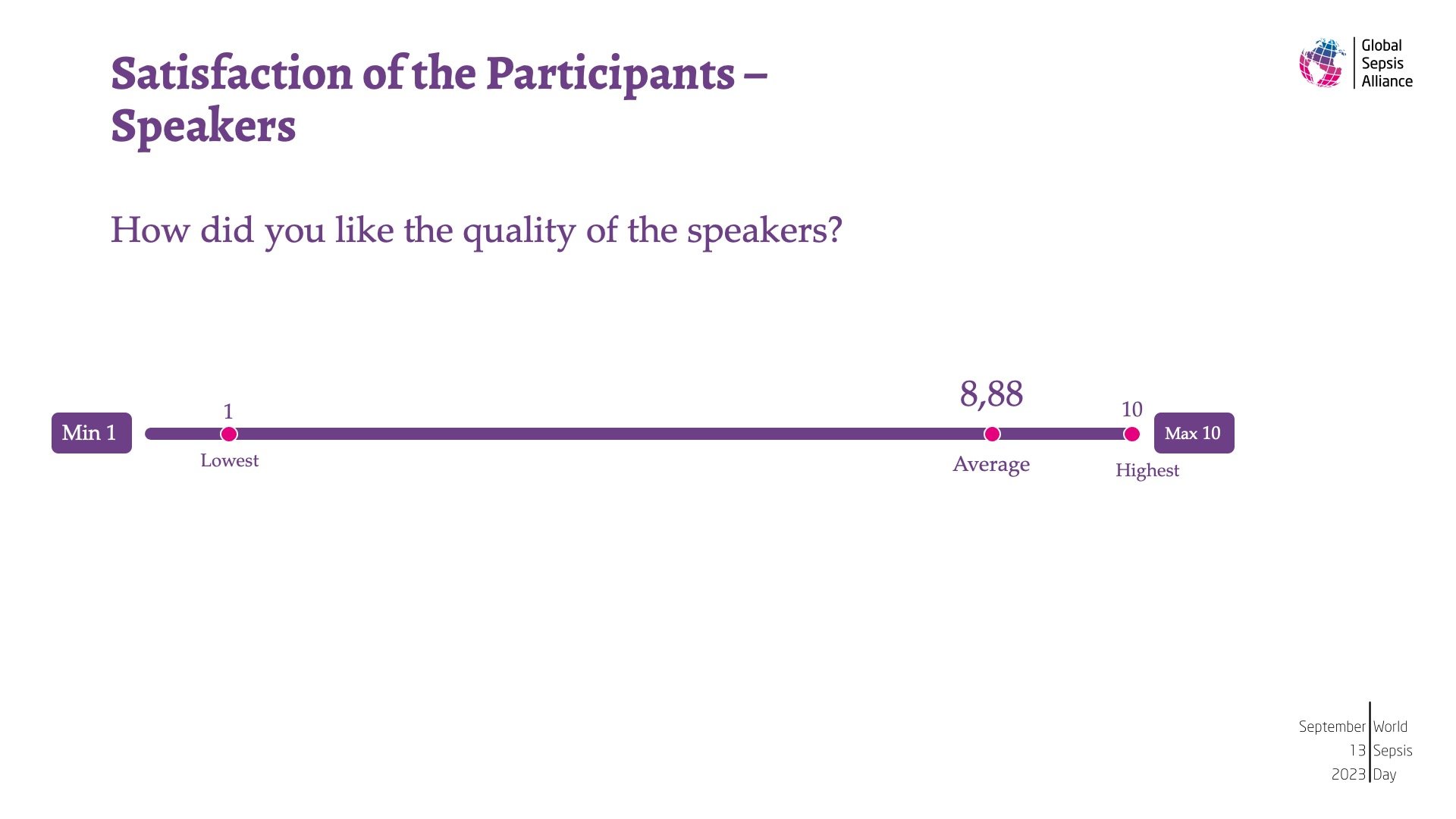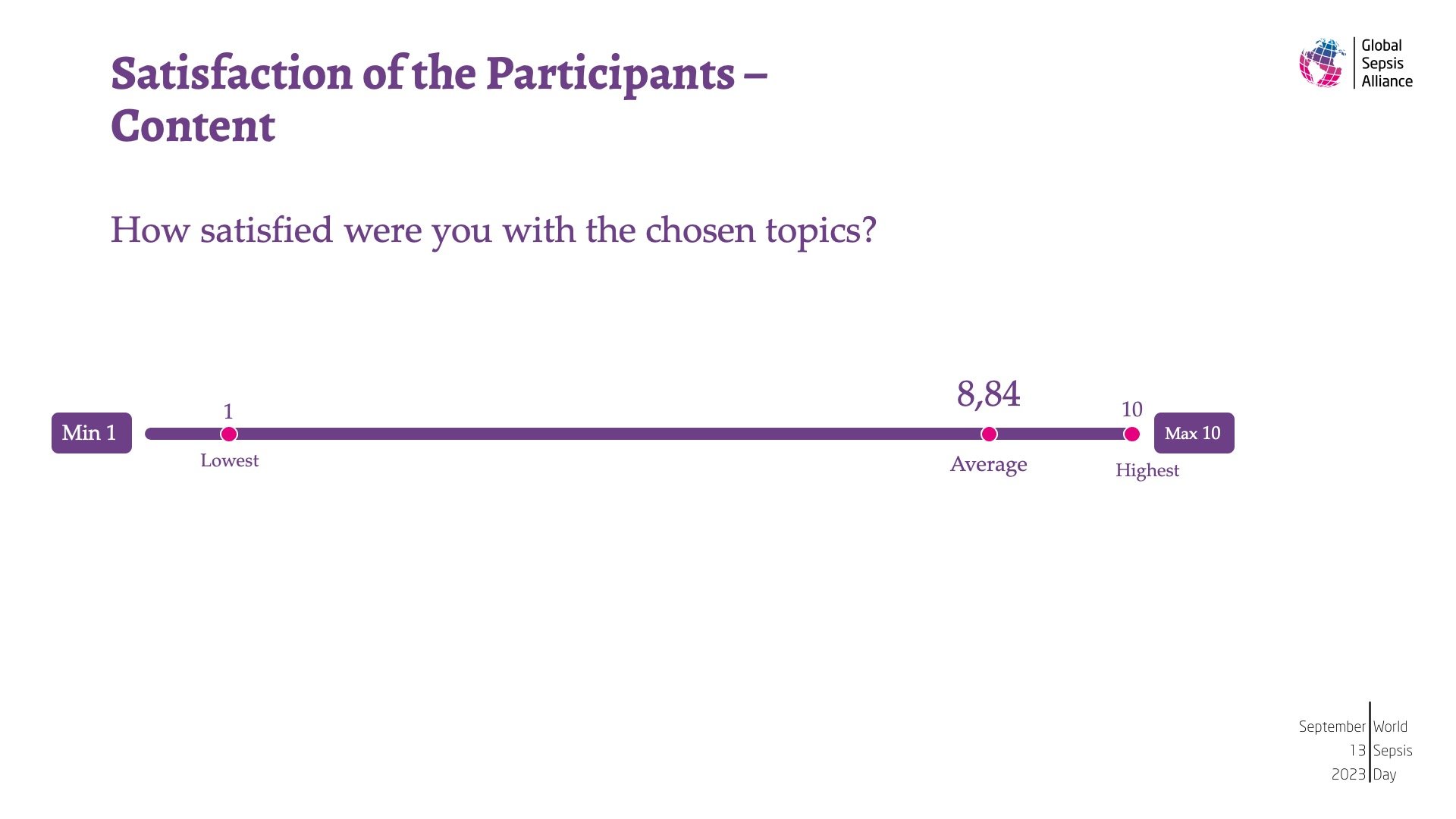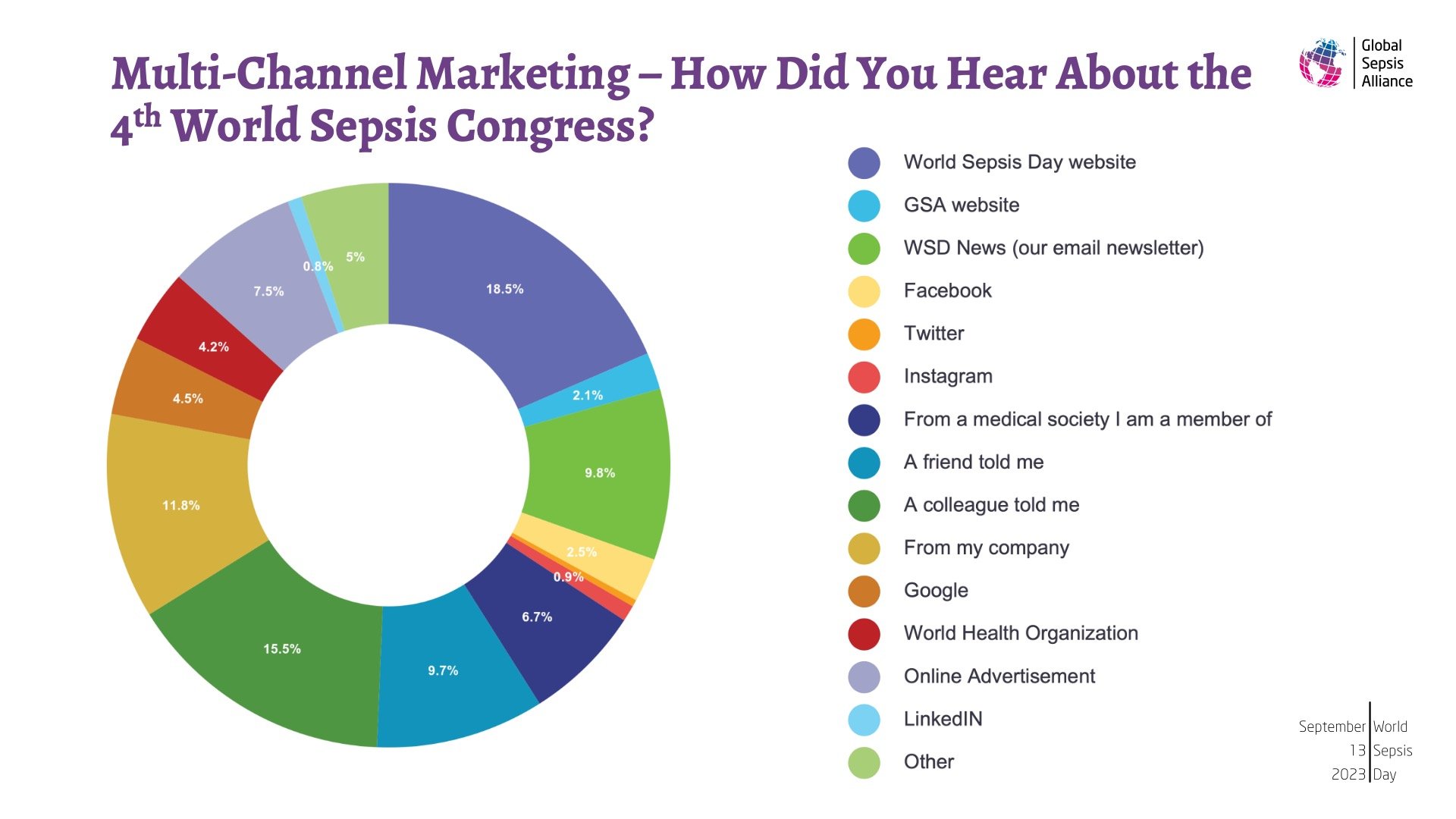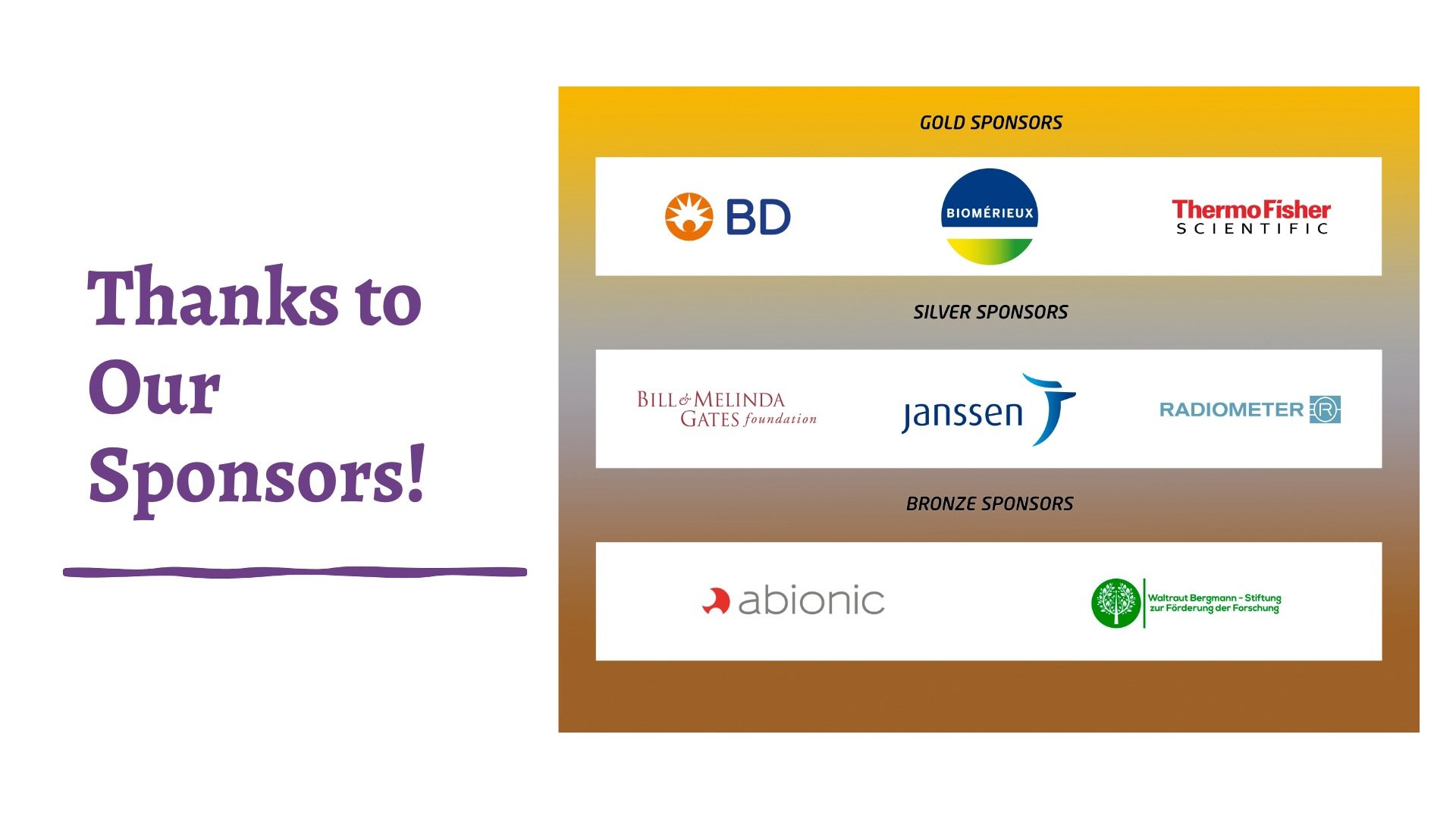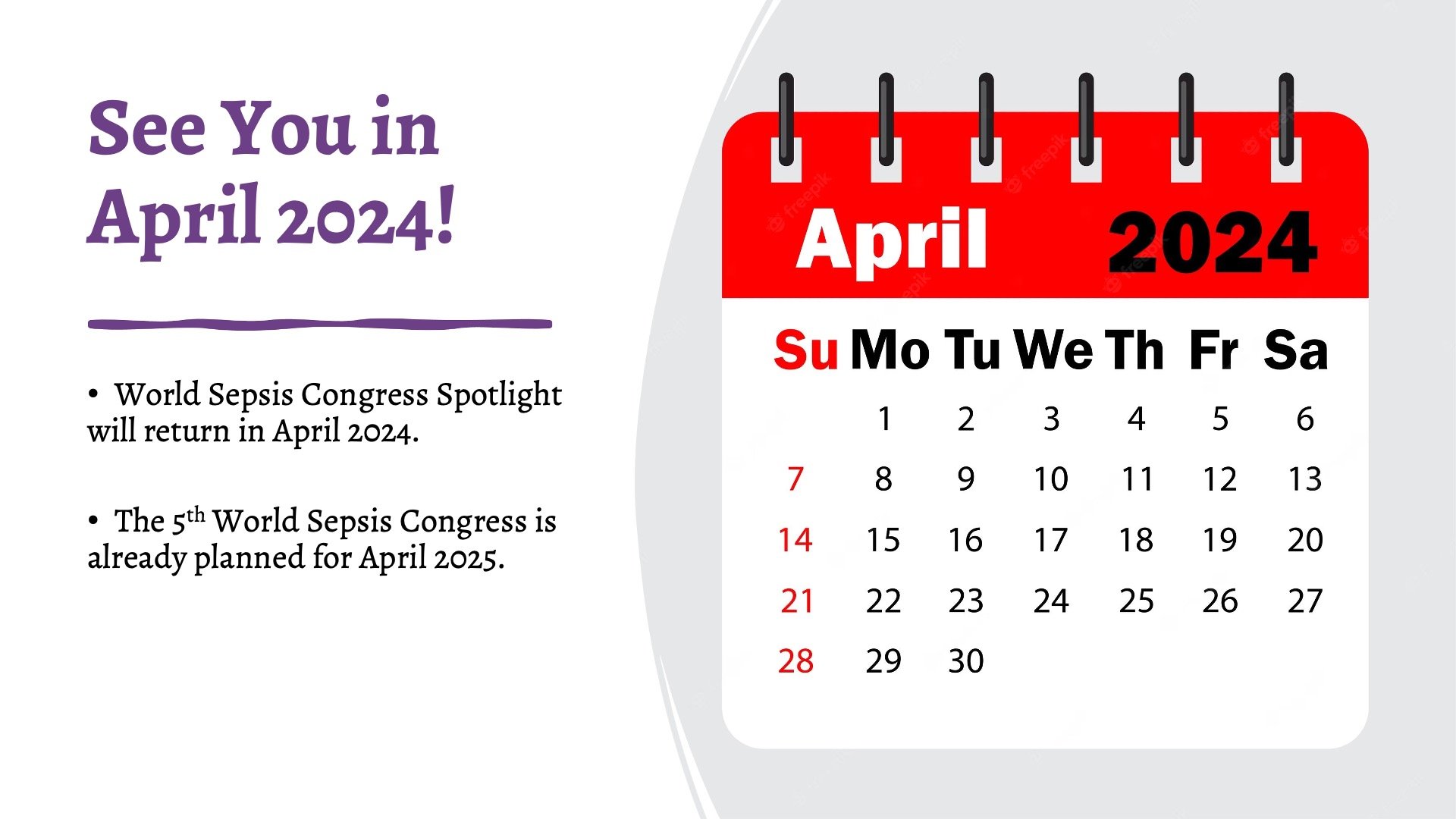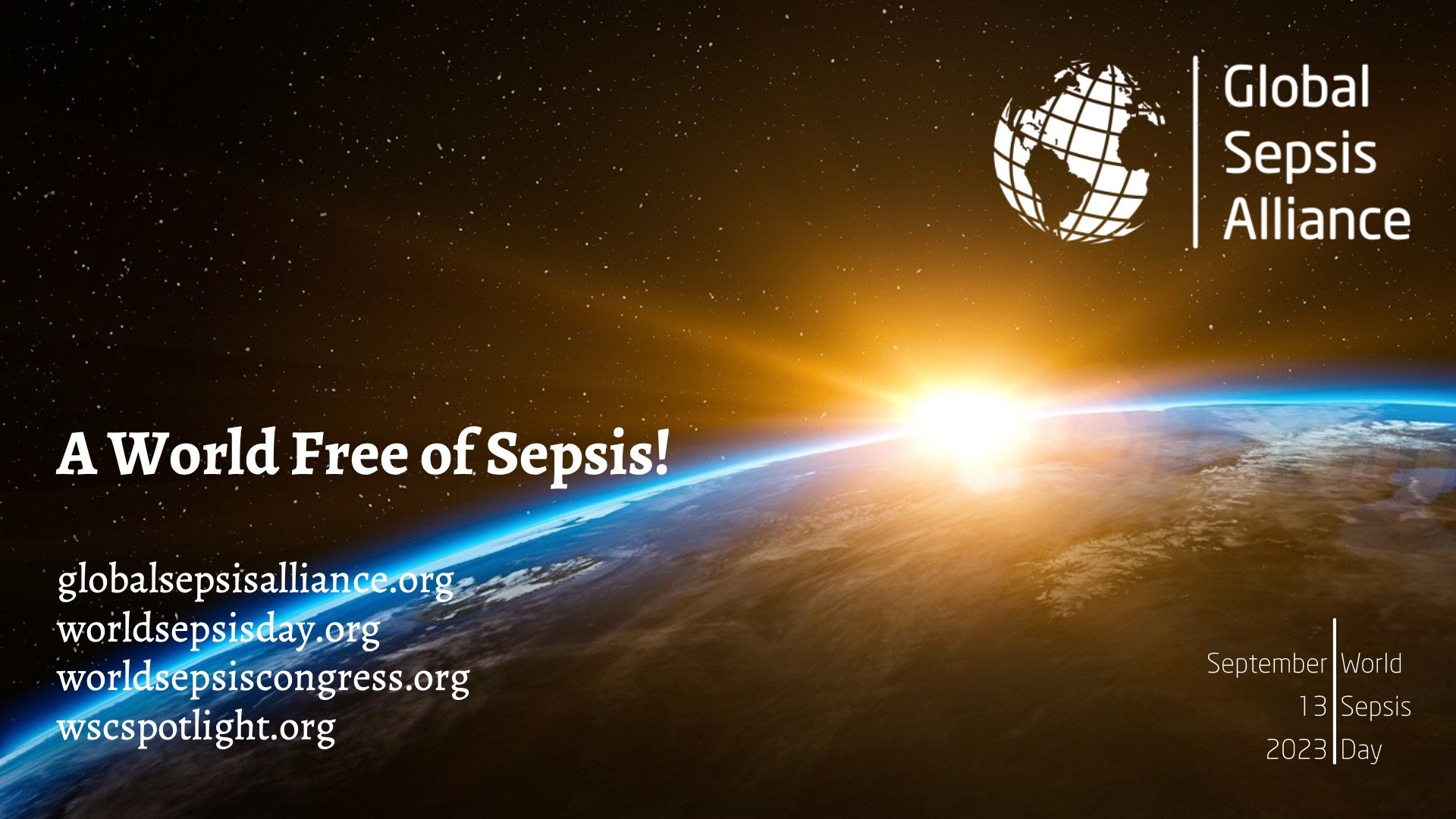As already announced, 12 sessions of the 4th World Sepsis Congress have been accredited by the Physician-Patient Alliance for Health & Safety (PPAHS) for continuing medical education (CME) credits.
The CME credits are now available for 12 of the 16 sessions of the congress (excluding S1, S5, S13, and S15), 18 credits in total are available, 1.5 per session.
Requesting your credits will come with a one-time $25 fee per person, allowing you to obtain credits for up to all 12 sessions.
Sessions 13 and 14 from the 4th World Sepsis Congress are now available on YouTube (embedded above) and as a Podcast on Apple Podcasts (just search for World Sepsis Congress in your favorite podcast app).
Session 13: The Impact of Survivors and Family Members to Improve Sepsis Awareness and Advocacy
Panel Discussion
Participants:
Ciarán Staunton, End Sepsis, United States of America
Melissa Mead, UK Sepsis Trust, United Kingdom
Ken Rothfield, Texas Health, United States of America
Luis Antonio Gorordo Del Sol, Sepsis Mexico, Mexico
Doireann O’Mahony, Irish Sepsis Foundation, Ireland
Mary Steele, Sepsis Australia Consumer Advocacy Group & Queensland Paediatric Sepsis Program, Australia
Session 14: Maternal Sepsis: Why Is It Still in the Top 3 for Global Incidence of Sepsis?
An Epidemiology-Based Assessment of the Problem
Alan Tita, University of Alabama at Birmingham, United States of America
Sharing the Story
Video
Sepsis Awareness and the Importance of Advocacy – Perspective of a Midwife and Sepsis Survivor
Helen Cheyne, University of Stirling, United Kingdom
Early Detection and Management – What Does It Mean for Maternal Sepsis?
Maria Fernanda Escobar Vidarte, The International Federation of Gynecology and Obstetrics, Colombia
Can Changing the Health System’s Approach Improve Maternal Sepsis Outcomes in Argentina and Beyond?
Edgardo Abalos, Independent Researcher, Argentina
Can Changing the Health System’s Approach Improve Maternal Sepsis Outcomes in Lebanon and Beyond?
Sabina Abou Malham, Université de Sherbrooke, Canada
Discussion by the Panelists
The Perspective of the World Health Organization
Benedetta Allegranzi, World Health Organization, Switzerland
Two sessions are released weekly on Tuesdays. The next sessions will be ‘Harnessing the Media to Advance the Global Fight Against Sepsis’ and ‘An Update on Research on Sepsis’ on June 20, 2023.
You can already subscribe on either platform to be automatically notified once new sessions are available.
Full Release Schedule
May 2:
S1: Opening Session – Key Success Factors to Address Global Health Threats
S2: The Health Economic and Human Burden of Infections and Pandemics
May 9:
S3: Overcoming Silos to Address Infection-Related Global Health Threats
S4: The Quality of Healthcare Systems and QI Efforts on Outcomes from Sepsis and Pandemics
May 16:
S5: Advances and Challenges by Our Regional Sepsis Alliances
S6: Advances in Timely Pathogen and Sepsis Detection
May 23:
S7: The Benefits of Multidisciplinary Teams in Sepsis Care on the Health Care Facility Level
S8: The Potential and Challenges to Intervene with the Immune Response
May 30:
S9: Biomarkers and Antimicrobial Stewardship – The Synergies to Diagnose Sepsis and to Prevent AMR
S10: Lessons from the Pandemic to Fight Common Infections and Sepsis
June 6:
S11: Understanding and Improving Long-term Outcomes after Sepsis and COVID-19
S12: Neonatal Sepsis Platforms and Guidelines
June 13:
S13: The Impact of Survivors and Family Members to Improve Sepsis Awareness and Advocacy
S14: Maternal Sepsis: Why Is It Still in the Top 3 for Global Incidence of Sepsis?
June 20:
S15: Harnessing the Media to Advance the Global Fight Against Sepsis
S16: An Update on Research on Sepsis
Thank you so much for participating in the 4th World Sepsis Congress – it was a great success, thanks to you.
We had over 15,400 registrations from 187 countries, which is amazing. 60% of our audience joined from low- and middle-income countries – showing how much interest there is all over the world. This truly highlights our mission with World Sepsis Congress – to bring knowledge about sepsis to all parts of the world.
We are also very excited about your feedback – glad to hear how much you enjoyed the congress. You can click through the full report above or download it as a PDF below. Feel free to share this report with colleagues, friends, family members, and beyond.
12 of the 16 sessions are already available on YouTube, as a Podcast on Apple Podcasts, and on the congress website. Sessions 13 and 14 will be released on June 13, and we conclude with sessions 15 and 16 on June 20. Thanks for your interest over the last and coming weeks – World Sepsis Congress will return with the 2024 WSC Spotlight in April 2024. If you are considering supporting World Sepsis Congress in the future, simply contact us.
Sessions 11 and 12 from the 4th World Sepsis Congress are now available on YouTube (embedded above) and as a Podcast on Apple Podcasts (just search for World Sepsis Congress in your favorite podcast app).
Session 11: Understanding and Improving Long-term Outcomes After Sepsis and COVID-19
The Burden of Long-Term Consequences of Sepsis and COVID-19
Jamie Rylance, World Health Organization, Switzerland
What Is Known on the Pathogenesis of Long-Term Sequelae by Infections and Sepsis?
Joost Wiersinga, Amsterdam UMC, The Netherlands
Toward Tailored Care for Sepsis Survivors
Erin Carlton, University of Michigan, United States of America
How Can We Mitigate Post-Sepsis and Post-COVID-Morbidity?
Hallie Prescott, University of Michigan, United States of America
Translating Post-Sepsis Care to Post-COVID-19 Care – The Role of Healthcare Systems
Stephanie Taylor, University of Michigan, United States of America
Session 12: Neonatal Sepsis Platforms and Guidelines
Disproportionate Burden of AMR Excess Deaths Experienced by Neonates in Low- and Middle-Income Countries
Ramanan Laxminarayan, University of Washington, United States of America
Incidence and Burden of Neonatal Sepsis in South Africa
Vanessa Quan, National Institute for Communicable Diseases, South Africa
Neonatal Sepsis and Treatment Challenges in India
Jeeva Sankar, All India Institute Of Medical Sciences, India
Invasive Bloodstream Infections and AMR in Africa: Approaches to Treatment and Next Steps
Uduak Okomo, MRC Unit, The Gambia
Next Steps for NeoSep
Julia Bielicki, St George’s University of London, United Kingdom
Two sessions are released weekly on Tuesdays. The next sessions will be ‘The Impact of Survivors and Family Members to Improve Sepsis Awareness and Advocacy’ and ‘Maternal Sepsis: Why Is It Still in the Top 3 for Global Incidence of Sepsis?’ on June 13, 2023.
You can already subscribe on either platform to be automatically notified once new sessions are available.
Full Release Schedule
May 2:
S1: Opening Session – Key Success Factors to Address Global Health Threats
S2: The Health Economic and Human Burden of Infections and Pandemics
May 9:
S3: Overcoming Silos to Address Infection-Related Global Health Threats
S4: The Quality of Healthcare Systems and QI Efforts on Outcomes from Sepsis and Pandemics
May 16:
S5: Advances and Challenges by Our Regional Sepsis Alliances
S6: Advances in Timely Pathogen and Sepsis Detection
May 23:
S7: The Benefits of Multidisciplinary Teams in Sepsis Care on the Health Care Facility Level
S8: The Potential and Challenges to Intervene with the Immune Response
May 30:
S9: Biomarkers and Antimicrobial Stewardship – The Synergies to Diagnose Sepsis and to Prevent AMR
S10: Lessons from the Pandemic to Fight Common Infections and Sepsis
June 6:
S11: Understanding and Improving Long-term Outcomes after Sepsis and COVID-19
S12: Neonatal Sepsis Platforms and Guidelines
June 13:
S13: The Impact of Survivors and Family Members to Improve Sepsis Awareness and Advocacy
S14: Maternal Sepsis: Why Is It Still in the Top 3 for Global Incidence of Sepsis?
June 20:
S15: Harnessing the Media to Advance the Global Fight Against Sepsis
S16: An Update on Research on Sepsis
As September 13 approaches, we can feel the anticipation for World Sepsis Day building. It's incredible how time flies, and we expect many events to take place. Among the activities lined up for this important day is the 7th Annual National Forum on Sepsis, presented by End Sepsis – The Legacy of Rory Staunton.
In the past year, END SEPSIS has made significant progress in making sepsis a top national priority. They have secured funding and support from the government and are developing new strategies to improve sepsis care. The END SEPSIS National Forum on Sepsis brings together leaders from various sectors to discuss recent gains and future plans. This event will take place in Washington, D.C., and will be live-streamed for a global audience.
We are excited to spread the word, so mark your calendars and join in person or virtually to be a part of this discussion. Together, we can make a difference in the fight against sepsis. Let's come together and ensure that sepsis is no longer a silent threat to our global community.
Sessions 9 and 10 from the 4th World Sepsis Congress are now available on YouTube (embedded above) and as a Podcast on Apple Podcasts (just search for World Sepsis Congress in your favorite podcast app).
Session 9: Biomarkers and Antimicrobial Stewardship – The Synergies to Diagnose Sepsis and to Prevent AMR
The Key Drivers of Antimicrobial Resistance
Silvia Bertagnolio, World Health Organization, Switzerland
The Potential and Barriers to Antibiotic Stewardship
Ron Daniels, Infection Management Coalition, United Kingdom
The Potential of Biomarkers for Antimicrobials – Use and Diagnosis
Evdoxia Kyriazopoulou, National and Kapodistrian University of Athens, Greece
The Role of Biomarkers for Risk Stratification
Peter Pickkers, Radboud UMC, The Netherlands
The Evidence for the Role of Transcriptional Diagnostics
Tom van der Poll, Amsterdam UMC, The Netherlands
Session 10: Lessons from the Pandemic to Fight Common Infections and Sepsis
Learnings to Leverage the Fight Sepsis from an Integrated Health Service Perspective
Benedetta Allegranzi, World Health Organization, Switzerland
Preparing the EU to Manage Infections and Cross-Border Health Threats More Effectively
Velina Pendolovska, Directorate-General for Health and Food Safety, European Commission, Luxembourg
Lessons for Fighting Infections and Sepsis in Resource-Limited Settings
John Adabie Appiah, African Sepsis Alliance, Ghana
The Perspective of a Bedside Intensivist and the Potential of Telemedicine for Non-Covid Sepsis
Wiltrud Abels, Sepsis Stiftung, Germany
Learnings by a Caregiver and Researcher in Vietnam
Louise Thwaites, Asia Pacific Sepsis Alliance, Vietnam
Lessons for Clinical Research and Intensive Care Medicine
John Marshall, Unity Health, Canada
Discussion by the Panelists
Two sessions are released weekly on Tuesdays. The next sessions will be ‘Understanding and Improving Long-term Outcomes After Sepsis and COVID-19’ and ‘Neonatal Sepsis Platforms and Guidelines’ on June 6, 2023.
You can already subscribe on either platform to be automatically notified once new sessions are available.
Full Release Schedule
May 2:
S1: Opening Session – Key Success Factors to Address Global Health Threats
S2: The Health Economic and Human Burden of Infections and Pandemics
May 9:
S3: Overcoming Silos to Address Infection-Related Global Health Threats
S4: The Quality of Healthcare Systems and QI Efforts on Outcomes from Sepsis and Pandemics
May 16:
S5: Advances and Challenges by Our Regional Sepsis Alliances
S6: Advances in Timely Pathogen and Sepsis Detection
May 23:
S7: The Benefits of Multidisciplinary Teams in Sepsis Care on the Health Care Facility Level
S8: The Potential and Challenges to Intervene with the Immune Response
May 30:
S9: Biomarkers and Antimicrobial Stewardship – The Synergies to Diagnose Sepsis and to Prevent AMR
S10: Lessons from the Pandemic to Fight Common Infections and Sepsis
June 6:
S11: Understanding and Improving Long-term Outcomes after Sepsis and COVID-19
S12: Neonatal Sepsis Platforms and Guidelines
June 13:
S13: The Impact of Survivors and Family Members to Improve Sepsis Awareness and Advocacy
S14: Maternal Sepsis: Why Is It Still in the Top 3 for Global Incidence of Sepsis?
June 20:
S15: Harnessing the Media to Advance the Global Fight Against Sepsis
S16: An Update on Research on Sepsis
World Sepsis Day on September 13 is already looming on the horizon – will you be joining us to raise awareness for sepsis this year? We have collected a ton of resources, inspiration, and ideas for you here.
If you have any questions or can’t find what you are looking for, please contact us.
Sessions 7 and 8 from the 4th World Sepsis Congress are now available on YouTube (embedded above) and as a Podcast on Apple Podcasts (just search for World Sepsis Congress in your favorite podcast app).
Session 7: The Benefits of Multidisciplinary Teams in Sepsis Care on the Health Care Facility Level
Impact of Sepsis Multidisciplinary Team Care on Patients Outcomes
Yaseen Arabi, Ministry of National Guard Health Affairs, Saudi Arabia
Initiation of Antimicrobial Stewardship in Resource-Constrained Environments: A Multidisciplinary Approach
Mirfin Mpundu, Director of ReAct Africa, Zambia
Sepsis Nurse – A Voice to Lead and Transform Care
Amanda Harley, Children’s Health Queensland, Australia
Family-Centered Care and Integration of Care Bundles
Kawaldip Sehmi, International Alliance of Patients’ Organization, United Kingdom
Early Rehabilitation in Sepsis: Journey to Return Activities and Functional Independence
Mohammed Alatwi, King Fahad Medical City, Saudi Arabia
Discussion by the Panelists
Session 8: The Potential and Challenges to Intervene with the Immune Response
The Impact of the Pathogen and the Host Response on Survival
Jennifer Muszynski, Nationwide Children’s, United States of America
Sepsis Immune Endotypes
Mihai Netea, Radboud UMC, The Netherlands
The Effect of Risk Stratification and Timing of Host-Directed Therapy
Evangelos J. Giamarellos-Bourboulis, European Sepsis Alliance, Greece
The Pros of Platform Trials
Eirini Christaki, University of Ioannina, Greece
The Cons of Platform Trials
Niels Riedemann, CEO InflaRx, Germany
Two sessions are released weekly on Tuesdays. The next sessions will be ‘Biomarkers and Antimicrobial Stewardship – The Synergies to Diagnose Sepsis and to Prevent AMR’ and ‘Lessons from the Pandemic to Fight Common Infections and Sepsis’ on May 30, 2023.
You can already subscribe on either platform to be automatically notified once new sessions are available.
Full Release Schedule
May 2:
S1: Opening Session – Key Success Factors to Address Global Health Threats
S2: The Health Economic and Human Burden of Infections and Pandemics
May 9:
S3: Overcoming Silos to Address Infection-Related Global Health Threats
S4: The Quality of Healthcare Systems and QI Efforts on Outcomes from Sepsis and Pandemics
May 16:
S5: Advances and Challenges by Our Regional Sepsis Alliances
S6: Advances in Timely Pathogen and Sepsis Detection
May 23:
S7: The Benefits of Multidisciplinary Teams in Sepsis Care on the Health Care Facility Level
S8: The Potential and Challenges to Intervene with the Immune Response
May 30:
S9: Biomarkers and Antimicrobial Stewardship – The Synergies to Diagnose Sepsis and to Prevent AMR
S10: Lessons from the Pandemic to Fight Common Infections and Sepsis
June 6:
S11: Understanding and Improving Long-term Outcomes after Sepsis and COVID-19
S12: Neonatal Sepsis Platforms and Guidelines
June 13:
S13: The Impact of Survivors and Family Members to Improve Sepsis Awareness and Advocacy
S14: Maternal Sepsis: Why Is It Still in the Top 3 for Global Incidence of Sepsis?
June 20:
S15: Harnessing the Media to Advance the Global Fight Against Sepsis
S16: An Update on Research on Sepsis





